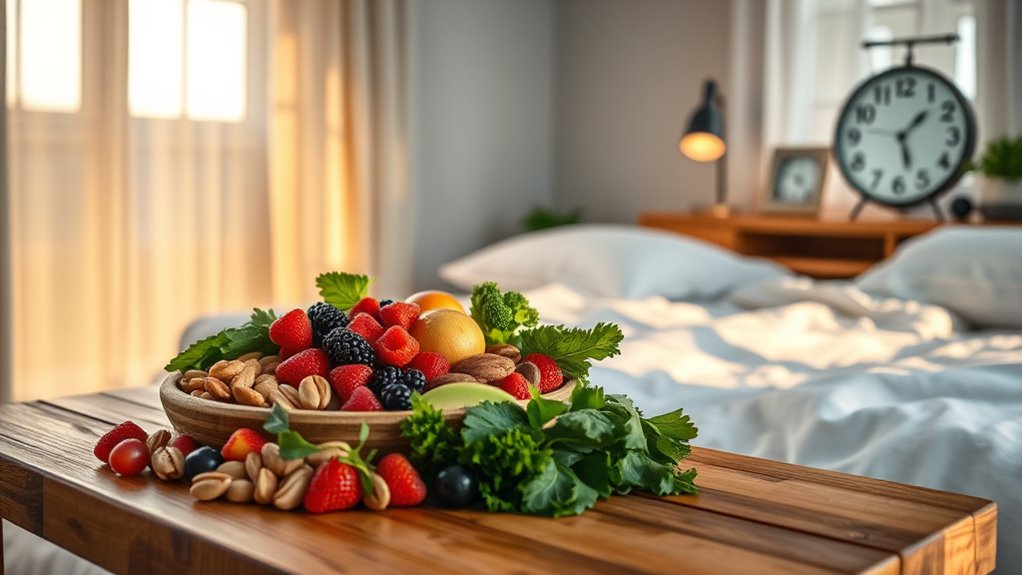Your diet substantially impacts your sleep quality through meal timing, food choices, and nutrient balance. Consuming heavy or spicy foods late at night can cause indigestion, while processed foods and sugar disrupt blood sugar levels, making it harder to fall asleep. Incorporating nutrients like magnesium, tryptophan, and complex carbs promotes relaxation and stable sleep cycles. Managing caffeine intake and choosing a regular eating schedule can further enhance your rest—exploring these connections can help you access better sleep tonight.
Key Takeaways
- Consistent meal timing supports circadian rhythms and promotes better sleep quality.
- Nutrients like magnesium, tryptophan, and complex carbs enhance relaxation and melatonin production.
- Limiting caffeine, sugar, and processed foods prevents sleep disruptions caused by blood sugar fluctuations and alertness.
- Late-night heavy or spicy meals can cause indigestion, impairing sleep onset and continuity.
- A relaxing sleep environment and healthy lifestyle habits reinforce nutrient-based strategies for restful sleep.

Nature's Bounty Magnesium 500 mg Tablets, High Potency Magnesium Supplement for Bone & Muscle Health, Whole Body Support, 200 Count (Pack of 1)
SUPPORTS BONE AND MUSCLE HEALTH (1): These magnesium tablets help maintain bone health and play a role in…
As an affiliate, we earn on qualifying purchases.
As an affiliate, we earn on qualifying purchases.
How Caffeine Affects Sleep Cycles

Caffeine is a stimulant that can considerably disrupt your sleep cycles, especially if consumed later in the day. Its effects depend on your caffeine metabolism, which varies from person to person. When you consume caffeine, it blocks adenosine receptors, making you feel more alert. However, caffeine stays in your system for several hours, delaying melatonin production and reducing sleep quality. If you regularly drink caffeine and suddenly stop, you might experience caffeine withdrawal symptoms like headaches and fatigue, which can further interfere with sleep. Understanding your caffeine metabolism helps you manage intake, ensuring it doesn’t impair your rest. Limiting caffeine consumption in the afternoon can help maintain your natural sleep-wake cycle and improve overall sleep quality. Additionally, being aware of the impact of different filters in air purifiers can help improve indoor air quality, which may also contribute to better sleep.

Pure Encapsulations Melatonin 0.5 mg – Natural Sleep Helper for Bedtime – Regulates Sleep-Wake Cycle – 0.5 mg Melatonin – Vegan & Non-GMO – 60 Capsules
Gentle Sleep Supplement: Pure Encapsulations Melatonin 0.5 mg provides melatonin, a hormone that naturally regulates the sleep-wake cycle…
As an affiliate, we earn on qualifying purchases.
As an affiliate, we earn on qualifying purchases.
The Role of Carbohydrates and Sleepiness
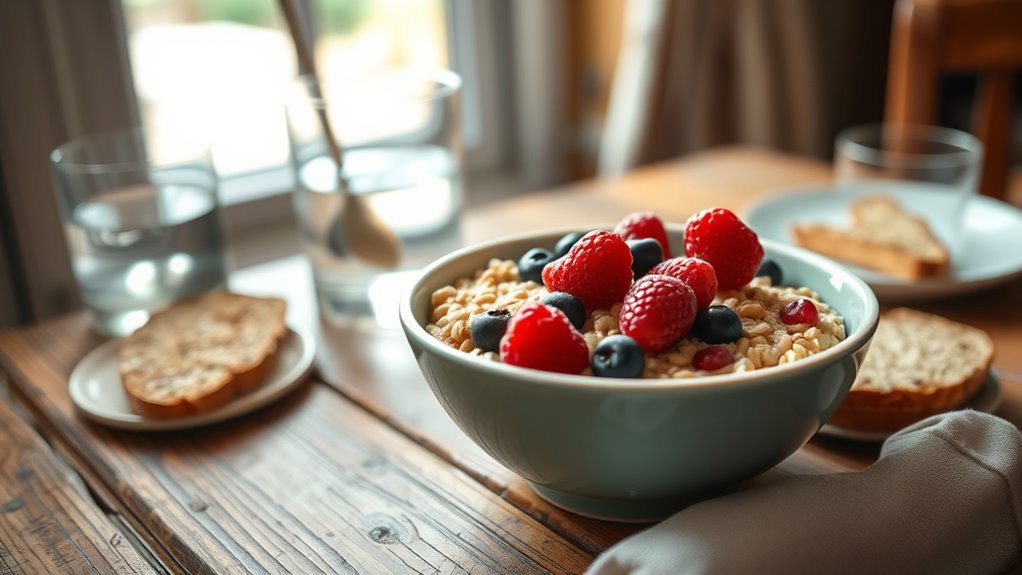
Carbohydrates play a significant role in regulating sleepiness by influencing your body’s production of sleep-related hormones. When you consume carbohydrate-rich foods, your body releases insulin, which helps amino acids enter muscles and leaves tryptophan available in your bloodstream. Tryptophan is a precursor to serotonin and melatonin, hormones that promote relaxation and sleepiness regulation. Incorporating water-based activities can further enhance relaxation and support better sleep quality.
- Eating complex carbs like whole grains can stabilize blood sugar levels, supporting consistent sleep cues
- Timing your carbohydrate intake earlier in the day may prevent nighttime sleep disruptions
- Combining carbs with protein can enhance tryptophan absorption, boosting sleepiness and relaxation
Understanding how carbohydrate intake impacts sleepiness regulation helps you fine-tune your diet for better sleep quality.

NatureBell Valerian Root for Sleep, 300 Veggie Capsules with Magnesium Glycinate, Chamomile, Passionflower, Lemon Balm, Ashwagandha, & More – Relaxation & Sleep Support Supplement – Melatonin Free
Extra strength 11-in-1 Valerian Root Complex, combining potent plant extracts, amino acids, and essential nutrients for comprehensive relaxation…
As an affiliate, we earn on qualifying purchases.
As an affiliate, we earn on qualifying purchases.
Nutrients That Promote Restful Sleep

Did you know that certain nutrients can directly enhance your ability to fall asleep and stay asleep? Herbal remedies like chamomile and valerian root are popular choices, and melatonin supplements can help regulate your sleep cycle. Incorporating these into your routine may improve sleep quality. Here’s a quick look:
| Nutrient/Remedy | Source | Effect |
|---|---|---|
| Melatonin | Supplements, cherries | Regulates sleep-wake cycle |
| Herbal remedies | Tea, capsules | Promote relaxation |
| Magnesium | Nuts, leafy greens | Supports muscle relaxation |
A growing body of research highlights the importance of sleep hygiene practices in conjunction with nutrient intake to optimize restful sleep.

LEVOIT Air Purifier for Home Bedroom Dorm Room, Smart & Voice Control, AHAM Verifide, 3-in-1 Filter With HEPA Sleep Mode, for Pollen, Pollutants, Smoke, Dander, Dust, Core 200S-P, White
𝐖𝐇𝐘 𝐂𝐇𝐎𝐎𝐒𝐄 𝐀𝐇𝐀𝐌 𝐕𝐄𝐑𝐈𝐅𝐈𝐃𝐄 𝐀𝐈𝐑 𝐏𝐔𝐑𝐈𝐅𝐈𝐄𝐑𝐒: AHAM (Association of Home Appliance Manufacturers) is an ANSI-accredited organization that sets…
As an affiliate, we earn on qualifying purchases.
As an affiliate, we earn on qualifying purchases.
The Impact of Sugar and Processed Foods
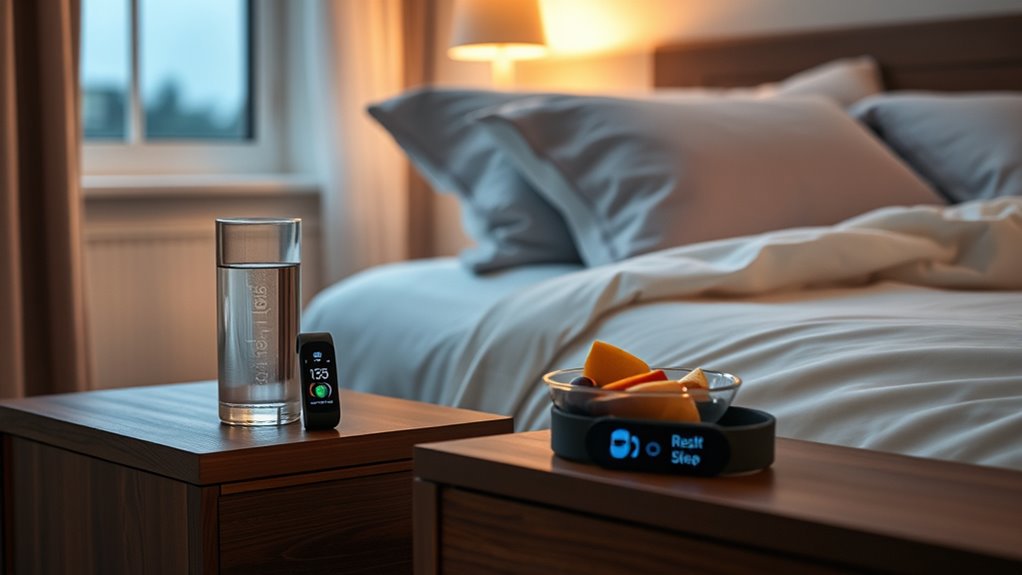
While nutrients like magnesium and herbal remedies can enhance sleep, what you eat throughout the day also impacts sleep quality. Consuming high amounts of sugar and processed foods can disrupt your rest. Foods rich in added sugars and food additives, such as artificial sweeteners, may cause fluctuations in blood sugar levels, leading to wakefulness during the night. Processed snacks and sugary drinks often contain preservatives and artificial ingredients that can irritate your digestive system, making it harder to fall asleep. Reducing intake of these foods can promote more stable sleep cycles. Additionally, the horsepower of electric dirt bikes demonstrates how energy levels and performance depend on the quality of the power source, similar to how the quality of your diet influences sleep quality.
Eating less sugar and processed foods can help improve your sleep quality.
- Limit foods with artificial sweeteners and food additives
- Avoid sugary snacks before bedtime
- Choose whole, unprocessed foods for better sleep quality
Timing of Meals and Its Influence on Sleep

The timing of your meals can considerably influence your sleep quality, as eating too close to bedtime may interfere with falling asleep and disrupt sleep cycles. Maintaining a consistent meal schedule helps align your meal timing with your metabolic rhythm, supporting better sleep. When you eat at regular intervals, your body can better regulate digestion and hormone production, promoting restful sleep. Conversely, irregular meal timing can throw off your body’s internal clock, making it harder to fall asleep or stay asleep. To illustrate this, consider the table below:
| Meal Timing | Effect on Metabolic Rhythm | Sleep Impact |
|---|---|---|
| Early Dinner | Supports stability | Enhances sleep quality |
| Late Night Snack | Disrupts rhythm | Causes difficulty falling asleep |
| Consistent Schedule | Maintains balance | Promotes restful sleep |
| Irregular Timing | Disturbs internal clock | Leads to fragmented sleep |
Additionally, understanding the role of hormones involved in digestion can help explain how meal timing influences sleep patterns.
Hydration and Sleep Quality
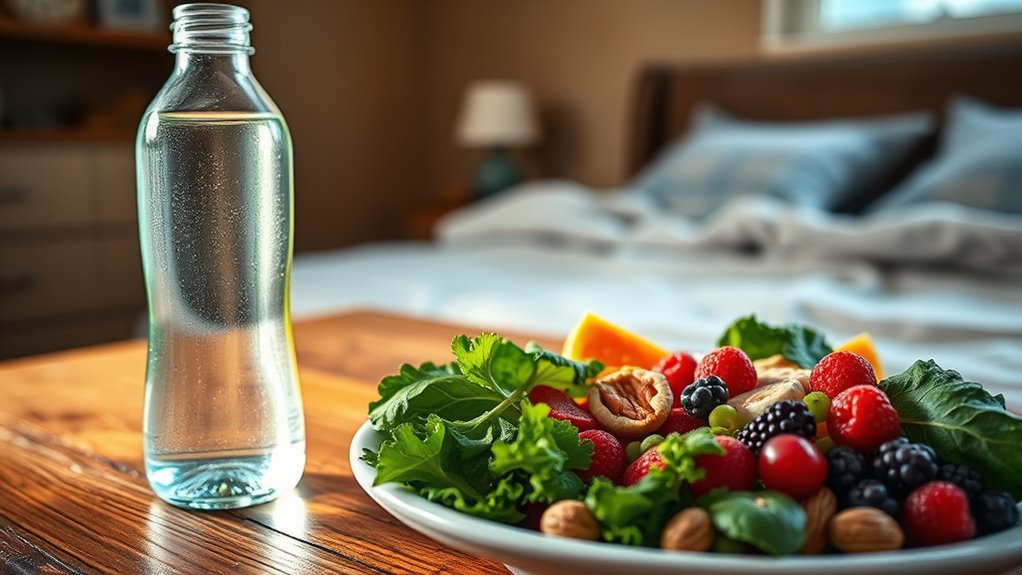
Staying properly hydrated is essential for quality sleep, as dehydration can lead to discomfort and disrupt your rest. When your body lacks fluids, it impacts electrolyte balance, making it harder to fall asleep and stay asleep. Drinking hydrating beverages, like water or electrolyte-infused drinks, helps maintain this balance and prevents waking up thirsty. Adequate hydration also reduces muscle cramps and headaches that can interfere with sleep. To optimize hydration, focus on consuming fluids throughout the day, especially before bed. Keep in mind that overhydration close to bedtime may cause frequent bathroom trips. Prioritizing proper hydration supports your body’s natural sleep cycles and promotes restorative sleep. Remember, hydration isn’t just about quantity—it’s about maintaining electrolyte balance for overall sleep quality. Proper hydration also supports HEPA filtration, which effectively removes allergens that can disturb sleep.
Dietary Patterns for Better Rest
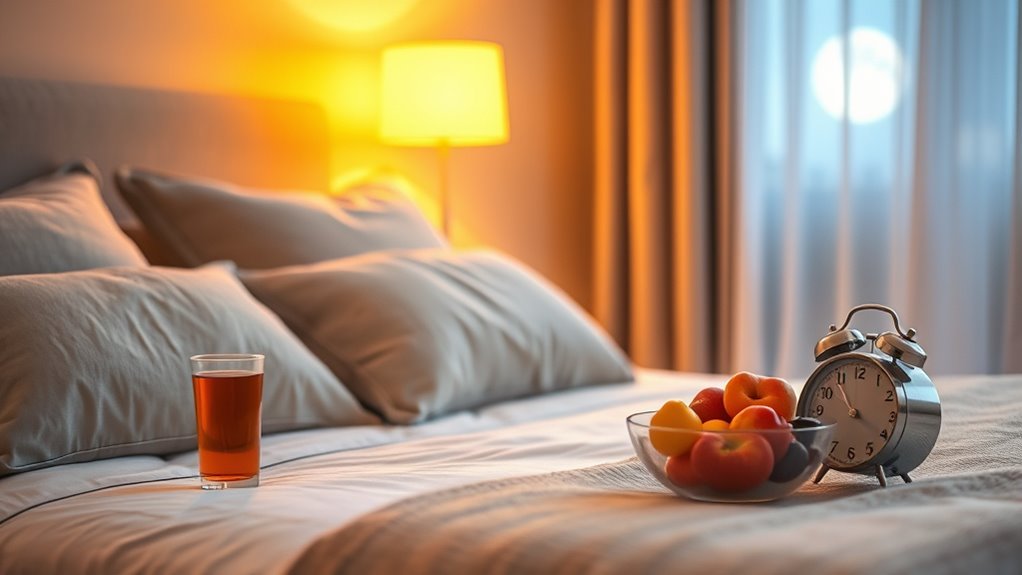
Your meal timing can impact how well you sleep, so try to eat at consistent, moderate hours. Focus on balancing nutrients like complex carbs, healthy fats, and proteins to support restful sleep. Additionally, avoid foods and drinks that can disrupt your rest, such as caffeine and heavy, spicy meals close to bedtime. Incorporating proper disposal practices for food waste can also contribute to a healthier environment and overall well-being.
Timing of Meals
Timing of meals plays an essential role in determining sleep quality, as when you eat can influence your body’s internal clock and sleep-wake cycle. Many meal timing myths suggest that eating late at night has no impact, but late night snacking can disrupt your rest by interfering with digestion and hormone production. To optimize sleep, aim to eat your last meal at least 2-3 hours before bedtime. Incorporating human-centered methodologies into your understanding of sleep habits can help identify personalized strategies for better rest. Here are some key points:
- Avoid late night snacking to prevent sleep disturbances
- Maintain a consistent meal schedule to support your circadian rhythm
- Don’t believe meal timing myths that suggest timing doesn’t matter for sleep quality
Understanding how meal timing affects sleep helps you make better choices for restful nights.
Nutrient Balance Focus
Focusing on nutrient balance in your diet is essential for improving sleep quality, as certain foods and nutrients directly influence relaxation and restfulness. Achieving proper meal composition guarantees you get a variety of micronutrients that work together in micronutrient synergy, enhancing their effects. For example, combining magnesium-rich foods with tryptophan sources supports relaxation and melatonin production. A balanced diet that includes complex carbs, healthy fats, and lean proteins helps stabilize blood sugar levels, preventing disruptions during the night. Prioritize nutrient-dense foods to optimize your nutrient intake without excess calories. By paying attention to your meal composition, you ensure your body receives the essential vitamins and minerals needed for restful sleep, making it easier to fall asleep and stay asleep throughout the night. Dad – Amazing Life Together emphasizes the importance of nurturing your body through balanced habits for overall well-being.
Avoiding Sleep Disruptors
While maintaining a balanced diet supports restful sleep, certain foods and habits can disrupt it if consumed or practiced at the wrong times. Alcohol consumption might make you feel sleepy initially, but it interferes with your sleep cycles, leading to restless nights. Late night snacking, especially on heavy or spicy foods, can cause indigestion and discomfort that keep you awake. Additionally, caffeine intake late in the day can linger in your system, delaying sleep onset. To improve sleep quality, avoid these common disruptors:
- Drinking alcohol close to bedtime
- Eating large or spicy meals late at night
- Consuming caffeine after mid-afternoon
Incorporating diverse designs in your environment, such as using aesthetically pleasing planters, can also promote relaxation conducive to better sleep.
Frequently Asked Questions
How Do Dietary Supplements Influence Sleep Quality?
Dietary supplements like melatonin and magnesium can markedly influence your sleep quality. Melatonin supplements help regulate your sleep-wake cycle, making it easier to fall asleep and stay asleep. Magnesium intake relaxes your muscles and calms your nervous system, promoting better rest. By incorporating these supplements into your routine, you may experience improved sleep patterns, better rest, and increased overall well-being. Just remember to consult with a healthcare professional before starting any new supplement.
Can Specific Foods Cause Vivid Dreams or Nightmares?
Certain foods can act as food triggers that lead to vivid dreams or nightmares. For example, spicy foods, caffeine, or heavy meals before bed may increase brain activity, serving as dream intensifiers. You might notice more intense or bizarre dreams after consuming these. To reduce this, avoid eating large or spicy meals late at night and cut back on caffeine in the evening, helping promote more restful sleep.
Does Alcohol Consumption Improve or Impair Sleep Patterns?
Think of your sleep cycle as a delicate dance, where alcohol’s impact is like a noisy guest disrupting the rhythm. While it might help you fall asleep faster, alcohol ultimately impairs your sleep cycle, causing fragmented rest and reducing REM sleep. This disruption leaves you groggy and unrested. So, instead of improving your sleep, alcohol tends to sabotage your body’s natural rhythm, making restful nights harder to achieve.
How Does Meal Composition Affect Sleep Apnea Severity?
Focusing on how meal composition affects sleep apnea severity, you should pay attention to meal timing and macronutrient balance. Eating large, heavy meals close to bedtime can worsen symptoms by increasing airway pressure. Opt for lighter meals with balanced macronutrients earlier in the evening. Consuming foods rich in healthy fats and proteins while limiting carbs and processed foods may help reduce apnea severity and improve your sleep quality overall.
Are There Cultural or Regional Dietary Habits Linked to Sleep Quality?
You may notice that cultural eating and regional patterns influence sleep quality. In some cultures, late-night meals or high-carb diets can disrupt sleep, while others emphasize lighter, balanced eating that promotes rest. Regional habits like spicy foods or alcohol consumption can also affect sleep patterns. By understanding these cultural and regional differences, you can adapt your eating habits to improve your sleep quality naturally.
Conclusion
By balancing bites and beverages, you can boost your bedtime bliss. Avoiding caffeine’s chaos, curbing cravings for carbs and processed foods, and timing meals thoughtfully all contribute to calmer, more consistent sleep cycles. Staying hydrated helps harmonize your rest, while nourishing nutrients nurture your nights. Remember, your dietary decisions directly dictate your dreams—so choose nourishing, natural foods and create a calm, comforting cue for quality, quiet sleep every night.
